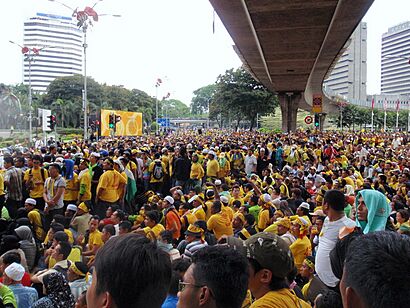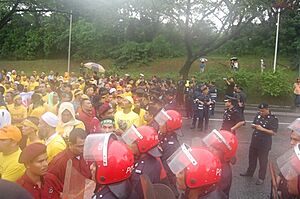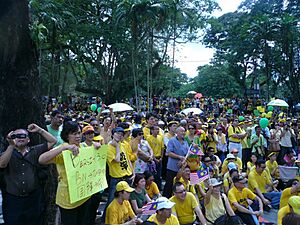Bersih 3.0 rally facts for kids
The Bersih 3.0 rally was a very large protest in Malaysia. It was also called the "Sit In" rally or "Duduk Bantah" in Malay. This protest happened on April 28, 2012.
It was organized by the Coalition for Clean and Fair Elections, known as Bersih. The main goal was to ask for free and fair elections in Malaysia. Many groups supported the rally, including Pakatan Rakyat, which is a group of major opposition political parties in Malaysia. Other groups like Himpunan Hijau (Green Assembly), which protested a mining project, also joined.
Besides the main rally in Kuala Lumpur, smaller protests took place in 10 other cities in Malaysia. People also gathered in 34 other countries around the world to support the cause. Bersih felt that the government's plans for election changes were not enough. They believed the Election Commission of Malaysia (EC) was not serious about making real reforms.
What is Bersih?
Bersih stands for the Coalition for Clean and Fair Elections. It is a group of 62 non-governmental organizations (NGOs) that started in November 2006. The word Bersih means "clean" in Malay.
Bersih is led by Ambiga Sreenevasan, a well-known lawyer. She even received an award from the US State Department for her courage.
Bersih has organized protests before. The first one was in 2007, and tens of thousands of people joined. Police used tear gas and water cannons to break it up. This rally helped opposition parties win more seats in the 2008 election. Another big rally happened in 2011, and police again used force.
Bersih's Main Requests
Bersih had eight main requests for fair elections:
- Make sure the list of voters is accurate and clean.
- Change how people who live far away or overseas vote (postal voting).
- Use special ink that cannot be easily removed when people vote.
- Allow political campaigns to last for at least 21 days.
- Give all political parties fair access to news and media.
- Make public organizations stronger and more independent.
- Stop corruption in politics.
- Stop unfair and dirty political tricks.
Leading Up to the Rally
The Announcement
In April 2012, a special committee in the government released its ideas for election changes. However, the report was passed without much discussion. Bersih felt that their demands were not truly met. Since a general election seemed close, Bersih announced the third rally for April 28, 2012.
Support from Groups
Many groups supported Bersih 3.0. The Bar Council of Malaysia and the Human Rights Commission (Suhakam) backed the rally. Religious councils also supported Bersih's right to peaceful protest.
Government's Response
The Home Minister, Hishammuddin Hussein, said the government had overreacted to the 2011 rally. He offered other places for the protest, like big stadiums, but Bersih wanted to protest in Dataran Merdeka.
The Information Minister, Rais Yatim, called the "clean" Bersih rally "dirty." He said the protesters did not respect the country's laws. The Kuala Lumpur City Hall put up barriers to stop the rally from happening in Dataran Merdeka.
Court Orders
A court ordered the police to clarify if Bersih was a banned group. The police also got a court order saying that any gathering at Dataran Merdeka would be illegal.
Election Commission Concerns
Before the rally, some people claimed that the chairman and deputy chairman of the Election Commission (EC) were members of a major political party. This raised questions about whether they could be fair. However, it was later found that the people named had similar names to the EC officials but were not the same individuals. The EC chairman stated that he and his deputy were appointed by the King.
The Protest Day
Despite police roadblocks, Bersih claimed that up to 300,000 people came to the rally in Kuala Lumpur. Police blocked nearly 58 roads leading into the city. Protesters gathered at different points and then tried to move towards Dataran Merdeka.
Police used tear gas and water cannons to break up the crowds. A police car hit some protesters, injuring two. Protesters then overturned the car to help those trapped. Later, some protesters protected the police officer who was driving. Some protesters were beaten by police officers.
A total of 512 people were arrested during the rally. This was fewer than the 1,667 people arrested in the 2011 rally. Police used a lot of tear gas during the protest. Social media was very important for organizing the rally and sharing Bersih's message.
Other Malaysian Cities
Many other cities in Malaysia also held Bersih rallies on the same day. These included Kota Kinabalu, Kuching, Kuantan, Penang, Ipoh, Miri, Malacca, and Johor Bahru.
Rallies Around the World
People in 35 countries and 85 cities worldwide held rallies to support Bersih. Large protests took place in cities across Australia, Singapore, and Thailand. Rallies were also organized in countries like India, Japan, South Korea, China, the United States, Canada, and many countries in Europe, including London.
What Happened After
Prime Minister's Comments
The Prime Minister of Malaysia, Najib Razak, spoke after the rally. He said that Bersih activists just wanted to make the government look bad and cause trouble with the police. He claimed the rally was political and aimed at taking over the government.
International Views
People from other countries who watched the Bersih rally described it as "peaceful," "festive," and "a good example." After the protests, some experts said that the Prime Minister's efforts to show he was making reforms might have been hurt.
See also
- List of protests in the 21st century
 | Selma Burke |
 | Pauline Powell Burns |
 | Frederick J. Brown |
 | Robert Blackburn |




